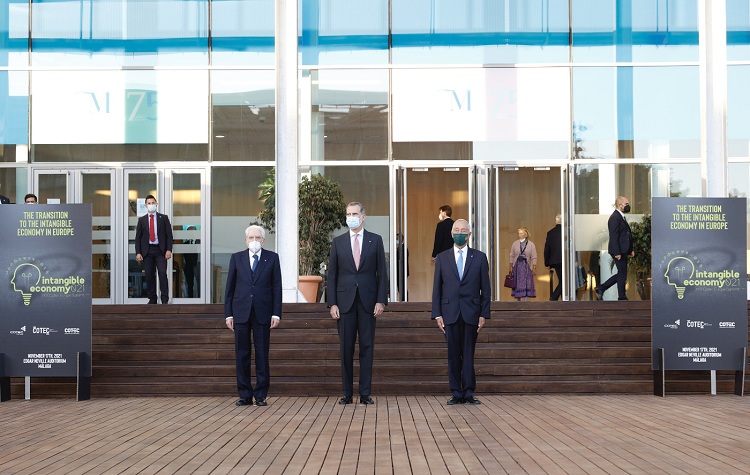The Diplomat
King Philip VI and the presidents of Italy, Sergio Mattarella, and Portugal, Marcelo Rebelo de Sousa, closed yesterday in Malaga the XIV COTEC-Europe Summit, whose central theme was The transition to the intangible economy in Europe.
During his speech at the closing ceremony, Philip VI warned that the “challenge of economic and social recovery” after the crisis caused by the COVID-19 pandemic involves investment “linked to intangible assets, such as training, research, innovation, strategy, reputation or data”. “Without this intangible capital, any deployment of infrastructure and other tangible assets, in areas such as the digital or ecological transition, will have limited impact,” he added.
The event included a panel discussion featuring the First Vice President of the Government and Minister of Economy and Digital Transformation, Nadia Calviño; the Chairman of Telefónica, José María Álvarez-Pallete; and the Chairman of CaixaBank, José Ignacio Goirigolzarri, to talk about the challenges facing the intangible economy in the public and private sectors. The session was moderated by the President of COTEC Spain, Cristina Garmendia. At the end of the meeting, the King presided over the dinner offered by COTEC to the heads of state and delegations at the Gran Hotel Miramar in Malaga.
The meeting, which each year is organized in a different country on a rotating basis, brings together the heads of state of Spain, Portugal and Italy, the three countries in which the Foundation for Technological Innovation (COTEC), of which the King is Honorary President, is established. The COTEC Europe Summit has been organized since 2005, with the attendance of authorities, entrepreneurs and relevant personalities in the field of research, development and innovation (R&D&I) in Europe. The latest edition took place in 2019 in Naples and the previous one was held at the National Palace of Mafra, near Lisbon. Spain has hosted the event on five occasions, the first four in Madrid (2006, 2009, 2012 and 2017) and yesterday’s, held in Malaga.
The COTEC Foundation arose in 1990 at the initiative of King Don Juan Carlos with the aim of promoting innovation as an economic and social engine. Since 2017, each meeting has been dedicated to a monographic content, which so far have been circular economy, employment automation and innovation in the public sector. The central theme of this year’s meeting – which was to be held on March 30 last year but was postponed because of the pandemic – was The transition to the intangible economy in Europe.
Spain, Italy and Portugal, at the European tail in “intangible assets”
During yesterday’s meeting, a report was presented, prepared by COTEC Spain with the collaboration of the Valencian Institute of Economic Research (IVIE), which analyzes the evolution of this type of assets in Italy, Spain and Portugal with respect to the European context between 1995 and 2018 and reveals that the three countries “share a low investment in intangible assets”, which places them at the bottom of the ranking of intangible intensity of the EU-15 countries (excluding Belgium and including the United Kingdom), as reported by COTEC. However, “of the three countries, Spain is shown to have the most dynamic behavior in intangibles between 1995 and 2018, with a higher contribution of these assets to productivity growth.”
Investment in intangible assets, typical of the knowledge economy, is “particularly weak” in the three countries analyzed in the R&D&I and worker training sections. On the other hand, they are in good positions in terms of brand image (advertising and market research). Specifically, Italy and Portugal stand out in design and Spain in assets linked to intellectual property.
By intensity of investment in intangibles among Europe’s top 15 economies, Portugal ranks tenth, Italy eleventh and Spain thirteenth. Ireland (16.4%) and Sweden (14.6%) lead the ranking in terms of investment in these assets as a percentage of GDP. The European average for intangible intensity is 8.3% of GDP. Spain (5.5%), Italy (6.7%) and Portugal (6.8%) occupy the last positions, together with Greece (4.2%).







